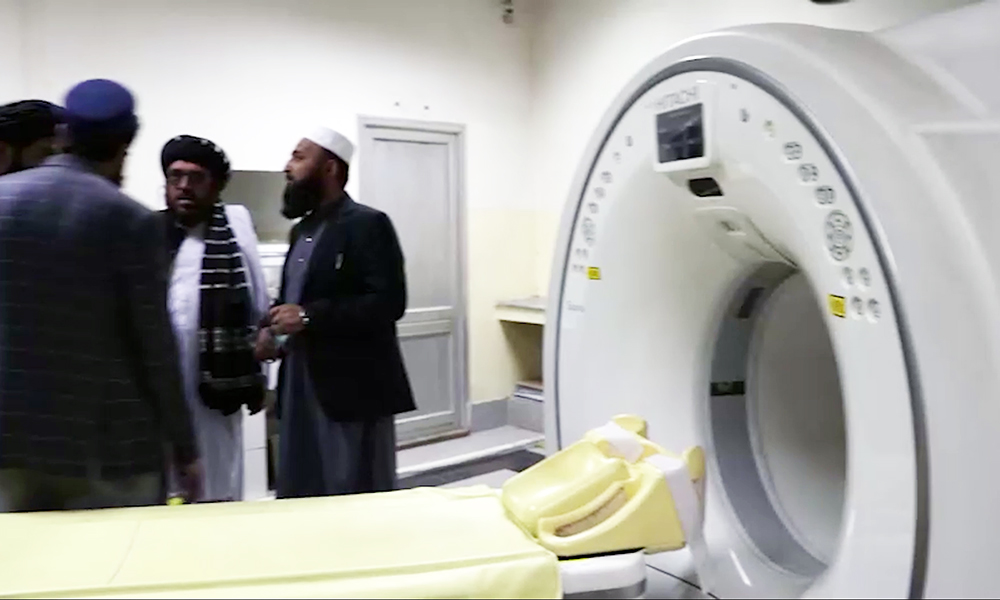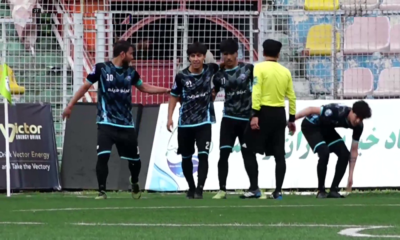Health
WHO’s chief calls for ‘engagement’ to prevent collapse of health sector

World Health Organization Director General Tedros Adhanom Ghebreyesus said on Thursday that the health system in Afghanistan is on the brink of collapse and called on the international community to engage with the new rulers, the Islamic Emirate of Afghanistan (IEA).
Giving a report back following his visit to Kabul this week, Ghebreyesus said: “In Afghanistan, we met with senior members of the Taliban (IEA) leadership, including the interim Prime Minister Mullah Mohammad Hasan Akhund. I believe that engaging the Taliban (IEA) leadership is essential if we are to support the people of Afghanistan.”
Ghebreyesus said that the health system in Afghanistan is on the brink of collapse.
“Over the past 20 years, significant health gains have been made in Afghanistan, in reducing maternal and child mortality, to end polio, and more. Those gains are now at severe risk, with the country’s health system on the brink of collapse,” he said.
According to him, almost 50% of children in Afghanistan are at risk of malnutrition and the country is facing an imminent humanitarian catastrophe unless urgent action is taken.
“There has been a surge in cases of measles and diarrhea; almost 50% of children are at risk of malnutrition; a resurgence of polio is a major risk; and 2.1 million doses of COVID19 vaccine remain unused,” Ghebreyesus said.
Ghebreyesus also raised his concern over the exodus of health workers from the country.
“Health workers are leaving, creating a brain drain that will have consequences for years to come,” said Ghebreyesus adding that “We visited a hospital where I met some nurses who have stayed. My heart broke when they told me they have not been paid in three months, but they said they would continue to serve their patients.”
Ghebreyesus also said that education is essential for protecting and promoting health in all countries, both in terms of health literacy, and for building the health workforce.
“The Taliban (IEA) leadership has announced that primary schools are open for boys and girls, and that they are preparing to open high schools to girls. In our discussions we offered to support that process, in partnership with other UN agencies,” Ghebreyesus said.
Ghebreyesus stated that at the moment the WHO’s priority is to support and sustain the health system in Afghanistan.
“The focus of our efforts now is to support and sustain the Sehatmandi project, which is the backbone of Afghanistan’s health system, providing care for millions of people through 2,300 health facilities, including in remote areas,” Ghebreyesus said.
He called on international donors to rapidly re-commit to finance the health system in Afghanistan and said the current pause in funding has resulted in only 17% of these facilities being fully functional at the moment.
He also said two thirds of all health facilities are out of stock of essential medicines.
“As a stop-gap measure, the UNCERF and the GlobalFund are financing WHO and our partners to ensure continuity of health services for the next three months. But this is simply not enough.
“WHO is calling on international donors to rapidly re-commit to finance Sehatmandi, as they have done for almost two decades. We simply can’t abruptly halt support for life-saving health services for millions of Afghans at a time when they’re most vulnerable,” he said.
Ghebreyesus also announced that WHO has now shipped more than 170 metric tons of medical supplies to Afghanistan in the past few weeks.
“We also need a reliable supply chain to be established urgently. WHO was the first agency to airlift essential medicines and supplies into Afghanistan, and we have now shipped more than 170 metric tons of medical supplies,” he said.
Afghanistan is now faced with a medicine shortage crisis due to disrupted border crossings and limited operation of banks along with the stoppage of foreign transactions.
Almost all medicine in Afghanistan is imported from neighboring countries, such as Pakistan, India, Bangladesh, Iran and Turkey.
However, the border crossings between Afghanistan and its neighbors were disrupted in the lead-up to the Islamic Emirate of Afghanistan’s (IEA) takeover, and normal operations are yet to resume.
Health
Azerbaijan urged to help improve capacity of Afghan health workers

Acting Minister of Public Health Qalandar Ebad, in a meeting with Azerbaijan’s ambassador, Ilham Mohammadov, called for the country’s assistance in improving the capacity of Afghanistan’s health workers.
The two sides also discussed cooperation in the health sector, capacity building of Afghan health workers, and Azerbaijan’s role in the health sector and other issues, according to a statement released by the Public Health Ministry.
Azerbaijan’s envoy said that his country seeks to cooperate with Afghanistan in a sustainable manner in the field of health.
In other news, the foundation stone for the construction of oxygen production facility was laid at the Indira Gandhi children hospital in Kabul.
Officials of the Ministry of Public Health said that the facility will be built with the financial and technical assistance of the World Health Organization, and with the capacity to produce 200 cylinders of oxygen daily to meet not only the needs of the hospital, but also other health facilities.
Health
Balkh health officials report sharp increase in number of cancer patients

Balkh Public Health Department officials say there has been a significant increase in the number of patients with cancer in the province.
“In 1401, about 2,613 OPD (out patient department) cases were registered with us. In 1402, these figures were 4,912 cases,” said Ehsanullah Kaliwal, the head of the oncology department at Balkh Regional Hospital.
Some doctors say genetic factors, environmental pollution, arbitrary use of medicines, and excessive consumption of meat were reasons for the sharp increase.
One doctor said cancer was also hereditry.
However, a large percentage of cancer patients in Balkh have stomach cancer. Many of them have appealed for the government to improve treatment facilities.
According to health officials, in the first month of this solar year (April), 423 cancer patients visited this hospital for treatment.
Health
Majority of Afghans with mental disorders are women: officials

Based on last year’s data, 52 percent of people with mental disorders in Afghanistan are women, the Ministry of Public Health said.
However, after the Islamic Emirate took over the country and with the improvement of nationwide security and the provision of better health services, mental disorders have decreased, the ministry said.
“Overall, the mental security of men and women in Afghanistan is not ensured and their mental security is disturbed. According to the figures shared with us, in 2023, 52 percent of the visitors for mental disorders were women,” said Sharaft Zaman Amarkhil, the spokesperson of the Ministry of Public Health.
“Generally speaking, we can say that compared to the past, the instances of mental illnesses have decreased,” he added.
People suffering mental disorders mostly refuse to share their problem, willingly or unwillingly.
“There are many problems at home; We are poor. I finished school, but didn’t find any job,” Ansar, a mentally ill person, said.
According to the World Health Organization (WHO), half of Afghanistan’s population suffers from mental distress.
Factors such as unemployment, poverty, domestic violence, ban on girls’ and women’s education and work, and drugs are said to be key contributors to mental distress.
-

 Latest News4 days ago
Latest News4 days agoRashid Khan named AWCC’s brand ambassador
-

 Regional5 days ago
Regional5 days agoIranian president lands in Pakistan for three-day visit to mend ties
-

 Sport5 days ago
Sport5 days agoKolkata beat Bengaluru by one run in IPL as Kohli fumes at dismissal
-

 Sport5 days ago
Sport5 days agoACL: Aino Mina 3-0 Istiqlal Kabul; Attack Energy 3-0 Khadim
-

 Climate Change5 days ago
Climate Change5 days agoRescuers race to reach those trapped by floods in China’s Guangdong
-

 World4 days ago
World4 days agoMalaysian navy helicopters collide in mid-air, 10 killed
-

 Sport4 days ago
Sport4 days agoJaiswal ton powers Rajasthan to big IPL win
-

 World3 days ago
World3 days agoNorth Korea officials visit Iran in a rare public trip
























